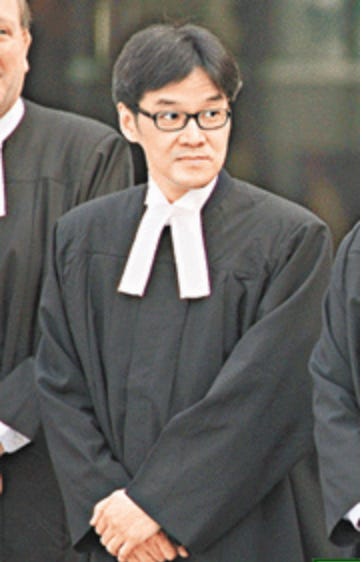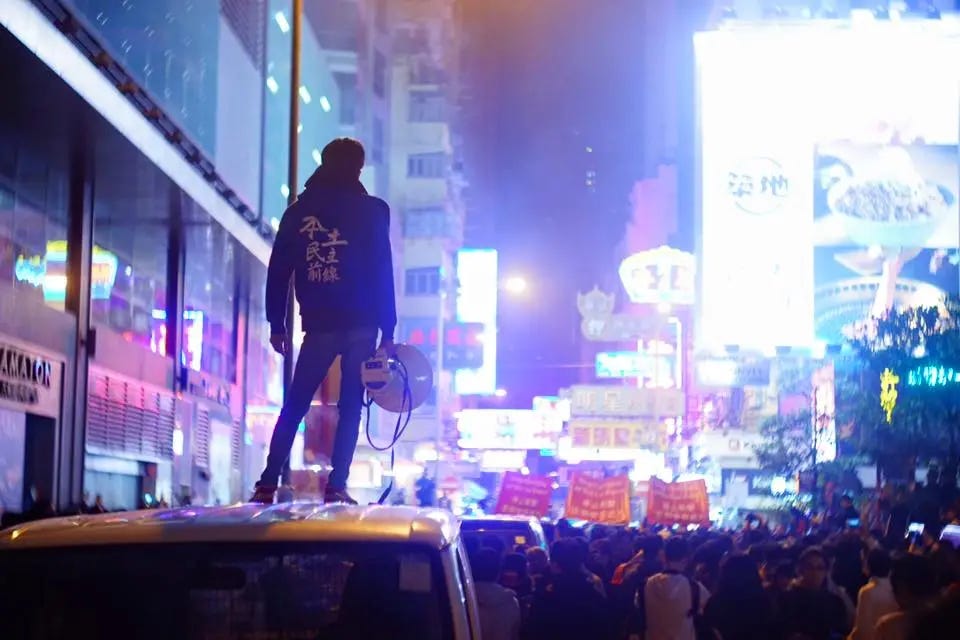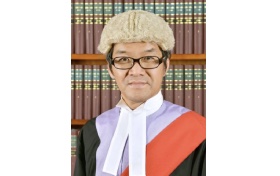This won’t make Bickett popular !
The last chief justice banned the Stand News judge from overseeing political trials. But when a new chief justice took over, everything changed.
Since early January, many Hongkongers have been captivated by the ongoing testimony of former Stand News Editor-in-Chief Chung Pui-Kuen, who is being prosecuted for sedition alongside former chief editor Patrick Lam and their now-defunct company. In a city where anti-establishment speech is heavily suppressed, Chung’s eloquent defense of the free press has garnered public praise and exposed the prosecutor questioning him, Laura Ng, as inept.
Yet throughout Chung’s testimony, the prosecution has violated the defendants’ rights by producing, day-after-day, hundreds of documents that it never gave the defense—a violation of common law and the Prosecution Code which, in egregious cases, warrants halting the proceedings permanently. But each time Ng has revealed another set of unproduced materials, the judge in the case, Kwok Wai-Kin, has quickly dismissed objections from defense counsel. Over and over, he has not only ordered the trial to proceed, but even allowed the withheld documents to be used to cross-examine Chung.
To those unfamiliar with Judge Kwok, his actions might seem shocking. But to court watchers, his actions aren’t surprising at all.
Since the 2019 Hong Kong protests, Judge Kwok has become notorious for his controversial rulings and political biases. Even in a judiciary increasingly influenced by Beijing, Kwok stands out. In 2020, Chief Justice Geoffrey Ma suspended Kwok from hearing political cases after he praised a defendant who stabbed three peaceful protesters, then compared the victims to terrorists. The next year, however, newly appointed Chief Justice Andrew Cheung reinstated Kwok, paving the way for his appointment as a national security judge. As a result, Kwok now handles one of the heaviest case loads of high-profile, politically charged “national security” cases in which the proceedings are choreographed and conviction is inevitable.
This series of articles will explore the life and rulings of Judge Kwok, who has become one of the most controversial and influential figures in Hong Kong’s judiciary. Part 1 will trace Kwok’s journey from an ordinary civil servant to a pro-Beijing radical, and his return from disgrace after the stabbing case to become a prominent national security judge. Part 2 will analyze Kwok’s pattern of biased, and at times outright abusive, rulings since being elevated to this new role.
Judge Kwok is an example of how Hong Kong’s judicial system, once respected for its independence and professionalism, has been eroded by Beijing’s interference and intimidation. Kwok’s radical views and actions have not hindered his career, but rather boosted it, as he has become a loyal enforcer of the Chinese regime’s crackdown on dissent and rule of law in Hong Kong. By examining Kwok’s biography and verdicts, we can gain insights into how and why many judges and magistrates in Hong Kong have abandoned their legal principles and ethics, and to the pressures of nationalism, ambition, and fear. Through Judge Kwok, we can witness the transformation of the judiciary from a guardian of the rule of law to a tool of political oppression.
An ordinary civil servant
On May 23, 1989, as pro-democracy demonstrators occupied Tiananmen Square in Beijing, a group of Hong Kong lawyers published a statement of solidarity. In the document, they declared that they “support the student movement, oppose martial law, oppose the military, oppose violent suppression, oppose a news blackout, and call for open and forthright dialogue towards a peaceful solution.”
One of the signatories to this principled defense of democratic rights was a young barrister named Kwok Wai-Kin. Kwok was born and raised in Hong Kong, receiving his law certificate in 1982 after studying at the University of Hong Kong. He was a product of a British legal education system and society that, despite its many flaws and failures during the colonial period, by this point was teaching its lawyers to value rule of law and individual rights. So it was unsurprising that Kwok would support the young men and women demonstrating for just this sort of justice and fairness across the border in China.

In 1992, he was appointed as a magistrate, later becoming a principal magistrate. In his early years, he did little to distinguish himself, steadfastly applying the law without much fuss. In his many non-political rulings, he comes off as a by-the-books type, carefully hewing to sentencing guidelines and legal precedents in a range of cases from drug dealing to burglary. Indeed, one experienced barrister I’ve spoken to for this article described Kwok’s early reputation as that of an unassuming civil servant, and a “nice and fair guy.” Another barrister reported that he was largely unfamiliar with Kwok “until he became infamous” in 2019.
Outside of the courtroom, Kwok’s only brush with notoriety came in a minor 2004 incident in which he was accused in his private capacity of pressuring the Immigration Department to waive a replacement fee for a lost ID card. The Chief Justice at the time dismissed it as a private matter, and no action was taken.
In one of his final cases as a principal magistrate before promotion to the District Court in 2012, Kwok demonstrated his commitment to the law, as well as a bit of an independent streak. The defendant in the case was accused of “accessing a computer with a view to dishonest gain” by using a smartphone to secretly film women in a bathroom. In court, the defendant wanted to plead guilty, but Kwok rejected the guilty plea because he had concerns that the prosecution was overstepping by characterizing a smartphone as a computer—an exceedingly unusual move by a judge where a represented defendant pleads guilty. After a trial, Kwok found the defendant not guilty.
The verdict was overturned on appeal, but at a time when the judiciary was still believed to be positioning itself as independent of the government and Beijing, the case helped establish Kwok as a defender of that independence. One barrister I spoke to believed it was this case more than any other that allowed Kwok to break out of the “career purgatory” of principal magistrate and obtain a rare promotion to the district court later the same year.

It is possible that Kwok was simply a dedicated, principled civil servant before something in his life led to a drastic shift in his political views, causing him to become a true believer in the Communist Party and its right to bring the judiciary to heel. In hindsight, however, his actions suggest a less noble explanation, one that is common among Hong Kong’s government officials: that as Hong Kong changed, many of its civil servants sought to further their own careers by changing with it
In 1989 as a young lawyer, Kwok’s career advancement in British Hong Kong depended on supporting the Tiananmen protesters, so that’s what he did. In 2012, during the peak days of the post-Handover independent judiciary, his career advancement depended on showing his independence from the government, so he issued decisions showing his independence. Then sometime during or after the 2014 Occupy Central protests, as Beijing began encroaching on political dissent and stoking nationalism, he realized that his career advancement depended on pleasing Beijing, so he changed direction once again.
A canary in the coal mine? Kwok’s handling of the “Fishball Revolution” Case

The first indication that Kwok’s views on politics and law might have begun turning more extreme was in 2018, in the period of political uncertainty between the 2014 Umbrella Movement and the 2019 democracy protests. Kwok was one of several District Court judges assigned to rioting cases stemming from the 2016 “Fishball Revolution.” In that incident, during a traditional celebration in Mongkok commercial district over Lunar New Year in which vendors would hawk traditional snacks, Food and Environmental Hygiene Department officials arrived at the scene and began checking hawkers for cooked food licenses, which many did not have.
The tradition of hawkers selling snacks at Lunar New Year had a long, well-established history , so the efforts to end the practice drew anger from members of the public already resentful of perceived overreach by the Beijing-friendly government. In response, “localist” leaders—a moniker given to those who supported the Hong Kong self-determination movement—sent out calls on social media for supporters to come defend the hawkers. Police in riot gear then arrived and moved to shut down the event, leading to violent clashes. The police dubbed the entire event a riot and arrested dozens, many of whom were merely present and had nothing to do with the violence.
The alleged rioters were charged in groups, with Kwok overseeing a judicial trial for eleven of the defendants. Kwok convicted all eleven, despite little evidence that most of them had been violent. But while his reasoning showed a clear shift towards punishing Beijing’s opponents, he still hedged his views throughout. While maintaining the convictions were justified, Kwok distinguished himself from the opinions of some of his colleagues—and post-2019 Kwok himself—by maintaining that physical presence at a riot was not enough for conviction. Rather, he wrote:
“The accused must…be physically involved in the riot. Since rioting is an additional act of disrupting social peace in addition to illegal assembly, the defendant must participate in these acts of disrupting social peace to constitute participation in riots. The defendant may participate in the riot in different ways or degrees, but the defendant must do some individual activity in order to promote the occurrence and/or conduct of the riot (“some individual activity in furtherance of the riot.”
In other words, while Kwok took the position that no violence was needed, some action in furtherance of riot was; as such, he rejected the government’s contention that mere physical presence was enough for conviction.
Nonetheless, at sentencing, Kwok was harsh, showing little leniency towards the defendants or taking into account the complex social situation and aggressive police response that led to the violence. He rejected counsel arguments that each defendant should only be held responsible for the crimes they took part in, instead concluding that the defendants bore “collective liability” for the riot as a whole. This finding allowed him to sentence even nonviolent defendants to significant prison terms. His sentencing of an autistic man, Ng Ting-Kai, to two years and four months in prison went against the advice of probation officers. The longest sentence of four years and three months was given to a 17-year-old minor, Mo Jia-tao, while a 73-year-old received three years and five months.
Read more at ( and we suggest doing so) this is the first article of it’s type that we have seen digging into the biography of one of those who now holds the puppet strings in HK
https://samuelbickett.substack.com/p/how-kwok-wai-kin-rose-from-disgrace




